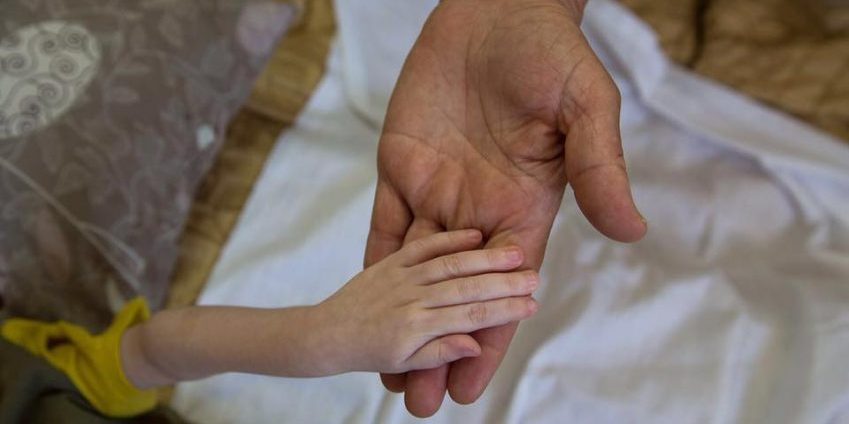
by Uzma Jafri
Alhamdulillah (praise be to God). If I stopped this article with that word alone, it would be complete.
I can begin my story with humble beginnings in the suburbs of Houston, TX. I grew up seeing lots of fun and frivolity, but also middle-of-the-night runs to help people, a tag along to my father’s missions. There were few, but I have flashes of these memories, some of which are explained, and some that are still none of my business. The takeaway message for me was:
“If someone comes to you for help, know that Allah put it in their heart to come to you. Don’t let Allah down.”
Like any good brown parent, my dad pushed me to become a doctor. It eventually became my own dream, but my understanding was that medicine would be how I could stop hunger and poverty.
On the authority of Abu Sa’eed al-Khudree (RA) who said:
I heard the Messenger of Allah (peace be upon him) say, “Whoever sees an evil, let him change it with his hand; and if he is not able to do so, then [let him change it] with his tongue; and if he is not able to do so, then with his heart — and that is the weakest of faith.”[Book of Saheeh Muslim].
After college, there were more responsibilities and tighter schedules. So I lost my voice and some of my steamrolling conviction in the process. Flash forward to work, marriage and kids. Talk about tighter schedules!
Alhamdulillah. I eventually figured out work, kids, and even marriage. I did more service activities with my kids as they got older, killing multiple birds with one stone in the process. I had planned to go to Greece to help Syrian refugees in the Spring because my youngest was finally old enough for me to leave. I had it all. Most importantly, I had four kids built like tanks who had never had an ear infection.
Then my four-year-old daughter had a seizure. My only daughter. She turned out to be incredibly sick; she couldn’t walk, talk, go to the toilet, or feed herself anymore. It was my next-to-last fear. I was going through the motions, adjusting my mindset so I could care for a special needs child for the rest of her life. People asked me how I was holding it together. I became very clinical, to the point that I didn’t understand when people broke down when they saw her. I had to bury my empathy, my mother’s heart, to cope with her disease. The idea that something like this could happen to me was mind blowing, so I was in shock.
Allah had never let me down, and I was sure He wouldn’t do that now. I was petrified that I had missed something big and He was directing me to fix it in this drastic way.
It was during prayer when the dark absorbed my tears. I couldn’t even say the words, but I knew Allah knew my duaa (supplications). When I found my words to ask, I prayed for her cure so I could leave and help the needy with the skills He gave me. Sure, bargaining with Allah may not be right, but it was my grieving process.
Alhamdulillah. The fact that our child was sick was a blessing. What a perfect trial for two people with backgrounds in healthcare. The disease she had was a gift because it was reversible, as well as a reminder to us of God. There are no accidents.
“Allah is the best of planners” (Surah Anfal verse 8).
He had our backs the entire time.
So with a daughter in rehab, my private practice, and three rambunctious boys at the end of their school year, I had a deal to make good on.
“Allah will not impose blame upon you for what is meaningless in your oaths, but He will impose blame upon you for [breaking] what you intended of oaths…” (Surah Maida 89).
My duaa was sincere, so my oath had to be.
Alhamdulillah. My opportunity came in an email from the Islamic Medical Association of North America. I had very peripherally helped them once and remained on their email list. These emails usually got shifted to my “Trash,” but this one somehow made it to my “Inbox.” There are no accidents.
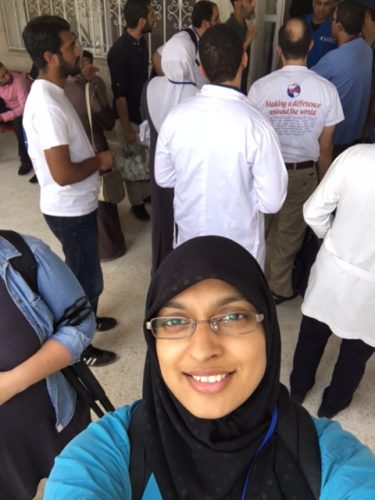 [Uzma Jafri at a medical camp in Amman, Jordan | Photo Courtesy of Uzma Jafri]
[Uzma Jafri at a medical camp in Amman, Jordan | Photo Courtesy of Uzma Jafri]
They were taking a medical mission trip to Jordan to help Syrian refugees. After filling out an application and following up on a couple of emails, I was notified that I made the team. At this point, I asked my husband who said, “Yay! You need this.” I hadn’t told him about my deal with Allah. After 10 years, your partner just knows what you need, sometimes more than you do.
Is there a lot of flack for women leaving their families to do anything? Oh yes.
“Why can’t you just write a check?”
“But your son is still breastfeeding!”
“What about the kids?”
“You’re so selfish.”
There are 1,001 reasons not to do something good, but only one to do it. To those asking themselves the same questions, the mirror is your biggest critic. Make your reflection support you and what you want. So often, our personal agendas get lost in fulfilling the wife/mother role, but one is not more important than the other. They can be accomplished simultaneously if you have a supportive spouse and family to help you. Another female physician mom on this trip would be making her THIRD medical mission overseas. Props to the women who know happiness is a choice.
Alhamdulillah, this past May I was able to travel to Amman, Jordan to provide free healthcare to Syrian refugees. Of the 600,000 displaced Syrians refugees in Jordan, 80% of them live in the cities, not in refugee camps. We set up a Basic Health Unit in the first floor of a villa near the Syrian border our first three days of clinic. In addition to several exam rooms, we had one room outfitted as the pharmacy so all patients could leave with their drugs.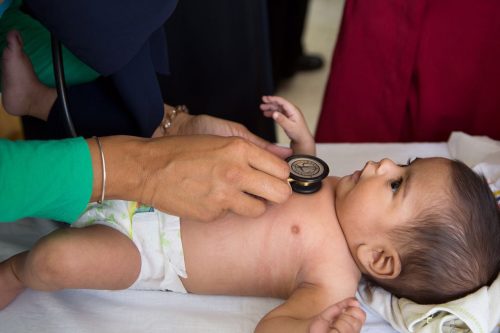 [Syrian Refugees, Amman, Jordan | Photo Source: IMANA.org]
[Syrian Refugees, Amman, Jordan | Photo Source: IMANA.org]
It was hot and the Syrian refugees would walk to the clinic. A bus from United Muslim Relief, the NGO on the ground, picked people up to bring them to us. Naturally, whole families came together. As one of the three female physicians there, I saw a lot of women. One of the doctors from Ohio had brought a portable ultrasound, so we were thankful to be able to check up on babies in utero, as many of the women came pregnant and didn’t have access to regular prenatal care.
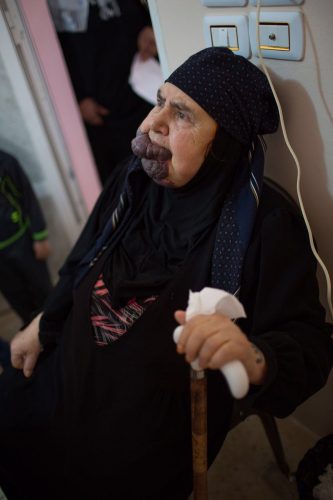 [Syrian Refugees, Amman, Jordan | Photo Source: IMANA.org]
[Syrian Refugees, Amman, Jordan | Photo Source: IMANA.org]
Some of what we saw was new. Many of the children suffer from delayed development due to malnourishment. Intestinal worms are highly common in Jordan and it’s something I had never treated in the US.
The backbones of the family, the women, suffer from anemia with direly low hemoglobins and they don’t take iron or eat red meat because they can’t afford either. They usually have anywhere from four to six kids to care for.
One mom of four had a 2-month-old she couldn’t bring to the clinic. She was 42-years-old and severely anemic, but we didn’t have any iron to give her. She wasn’t worried about herself but asked how to feed her baby who was on formula. She had come because her baby kept throwing up everything. First, we advised her to avoid water. Then we suggested oral hydration solution, and finally, I had a bottle of breastmilk to give her. I pumped on the way to the clinic every day and usually tossed it by the end of the night because there was no refrigerator to store it in our clinic.
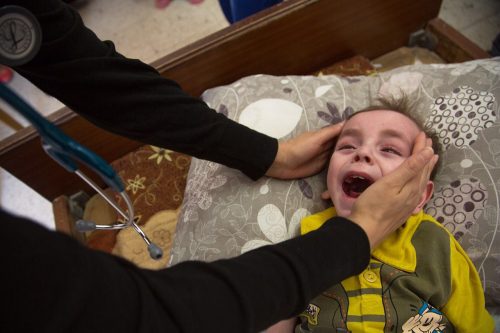 [Syrian Refugees, Amman, Jordan | Photo Source: IMANA.org]
[Syrian Refugees, Amman, Jordan | Photo Source: IMANA.org]
Some things I saw touched my core. It’s very common for refugee girls to be married young, an effort to make sure a daughter can have stability and opportunity to eat outside of her overburdened, newly-impoverished parents’ home. This is no different for Syrian refugees.
One day, I counseled a 16-year-old bride who had been married for a year, desperate for a child so her dying mother-in-law, still in Syria, could die knowing she had left a legacy. The mother-in-law wouldn’t leave her home in Aleppo. This girl was so shy, she made me want to cry because she was still just a child, older than a lot of younger brides amongst the Syrian refugees. She wouldn’t make eye contact and kept smiling the smile of a girl who knows a little more than her friends. She will never go to school again, and will gain a different wisdom, but I pray that she sees more success than that, gains more peace than she has. But more than likely, she would be pregnant by the end of the year, trading her dreams for someone else’s.
Another mom proudly displayed her 14-year-old’s pregnant belly to me, and she had another 16-year-old who was just married. Her third daughter, a 17-year-old was newly divorced, and I pulled her aside to urge her to pursue her education, something that would be out of her reach as an “older” refugee.
A different encounter showed me how little I could do with my stethoscope and clinical skills. A pregnant mother with five children complained about her 11-year-old son’s stutter that began a year and a half ago when they left Syria. His teacher hadn’t noticed since he never spoke in class because he was beaten up by a Jordanian kid in the schoolyard his first week there. He also had chronic headaches. At first, I congratulated him on being like Moses (peace be upon him) who was known to also have a stutter — a joke to put the boy at ease. Then I found out his parents had never discussed what happened in Syria with him. I asked him through a translator:
Was there something wrong at home or school? No.
Did someone hurt you at home or school? No.
Do you feel safe? Yes.
Can you take your time talking without feeling rushed? Yes.
Do you miss Syria? Yes.
Is there something that makes you worry or feel upset? Yes. When I hear the boys and girls screaming in the schoolyard, it makes me remember Syria and how they screamed there when the bombs fell.
Even my translator, a Syrian refugee herself, became teary-eyed but held her composure while I went to sob in a bathroom. My sons would never experience anything like this little boy had seen, and I pray they never do. There was nothing I could do to erase the memories of Syria that had been replaced by horrible images in this boy’s mind. We had no counselor or therapist with us. I felt useless and weak.
I walked out of that bathroom and straight into the angel of our operations, Ahmed Ahmer, a Syrian refugee working with United Muslim Relief in Jordan. He reassured me that UMR operated two children’s centers in Amman where three social workers and two therapists worked with the children suffering from PTSD. He went to the mother to sign up her children, including the little boy with the stutter. A bus would go out to pick them up for these services. There are no accidents.
The last three days of our clinic were operated out of a center in one of the poorest neighborhoods of Jordan. It had been a Palestinian refugee camp in 1967, but they replaced their tents with homes over the years and established the neighborhood. All people struggle to make it here.
This is where we met Abdul Malik again. He was a child we saw in the former clinic, two and a half years old, severely dehydrated, developmentally delayed, multiple deformities of his limbs, unable to walk, talk, or toilet. His parents said he got dehydrated a lot and they couldn’t afford to take him to the hospital again. Our resourceful doctors had figured out how to get fluids in him on Tuesday and Ahmed sent a bus to be picked up on Thursday for follow up. It was this day that his parents brought paperwork describing his diagnosis with a rare genetic disease to explain his delay. He needed special formula they couldn’t afford, and because he kept getting the wrong food, he got dehydrated and came close to death frequently. His diet also caused his mental retardation and physical deformities.
On Thursday, Abdul Malik looked a lot better, but his prognosis was poor. The pharmacist told us it would be impossible for them to afford his formula, and he spent the next day searching three pharmacies and Queen Rania’s Children’s Hospital looking for it. He couldn’t find it. We looked it up online and it would be $73 per can and would last only four days. The pharmacist had an epiphany as we drove away from the clinic that day. He mentioned that breast milk was a good substitute for the formula Abdul Malik’s family couldn’t buy. I had a little more than 72 ounces of milk pumped in the hotel’s refrigerator. I was planning a small ceremony to grieve its loss as I poured it down the drain that night. It wouldn’t last the long flight home. We arranged for it to be delivered to Abdul Malik the next day. There are no accidents.
[Donate to Support Syrian Refugees on Uzma’s next Medical Mission to Jordan]
On a bus my last night in Amman, it hit me that Abdul Malik was my son. My daughter’s illness and her prognosis, before I knew what she had, was his daily reality. Her disease prepared me for him, to be his milk mother and his advocate. Alhamdulillah.
We saw 1644 patients in five days. The need is still great and more teams are planning to go in the summer and fall to help the Syrian refugees. Jordan is truly a beautiful nation demonstrating true humanity by taking in those in need. It’s blessed with history and breathtaking countryside. Its people are the kindest I’ve ever met. I pray I’ll be blessed enough to go again and serve. I pray that those of us who went and our families who supported us are forgiven from sins, known and unknown, blessed in our undertakings and saved from every hardship and the Hellfire.
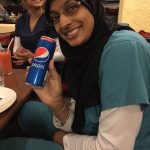 Uzma Jafri is from Texas, currently residing in Arizona. She works part-time as a family/geriatric doctor in a private practice as she raises her 4 kids full-time. She has her parents to thank for her faith and sense of service. Her husband to thank for his unending support and tolerance of her many projects and desires. But the best guidance is from Allah who allowed her to fulfill her dream of going overseas to do this work. While Uzma realizes she can’t cure the ills of the world, she is honored to be able to provide dignity for a few people and looks forward to doing it again.
Uzma Jafri is from Texas, currently residing in Arizona. She works part-time as a family/geriatric doctor in a private practice as she raises her 4 kids full-time. She has her parents to thank for her faith and sense of service. Her husband to thank for his unending support and tolerance of her many projects and desires. But the best guidance is from Allah who allowed her to fulfill her dream of going overseas to do this work. While Uzma realizes she can’t cure the ills of the world, she is honored to be able to provide dignity for a few people and looks forward to doing it again.



